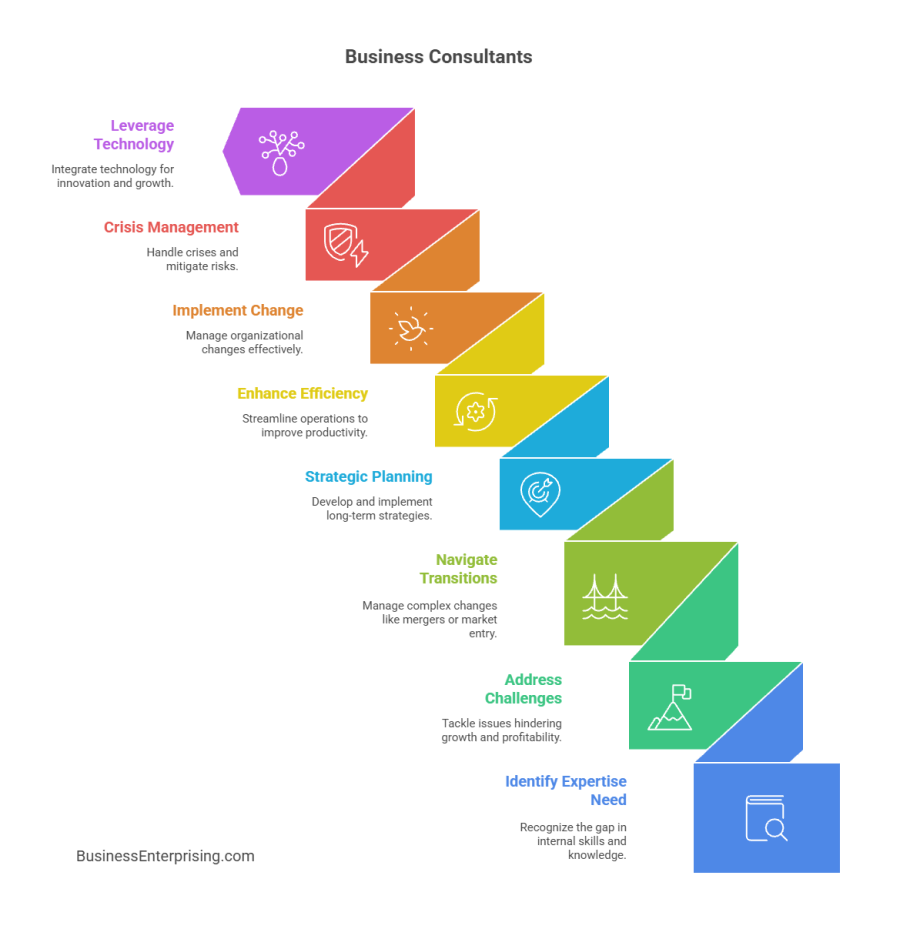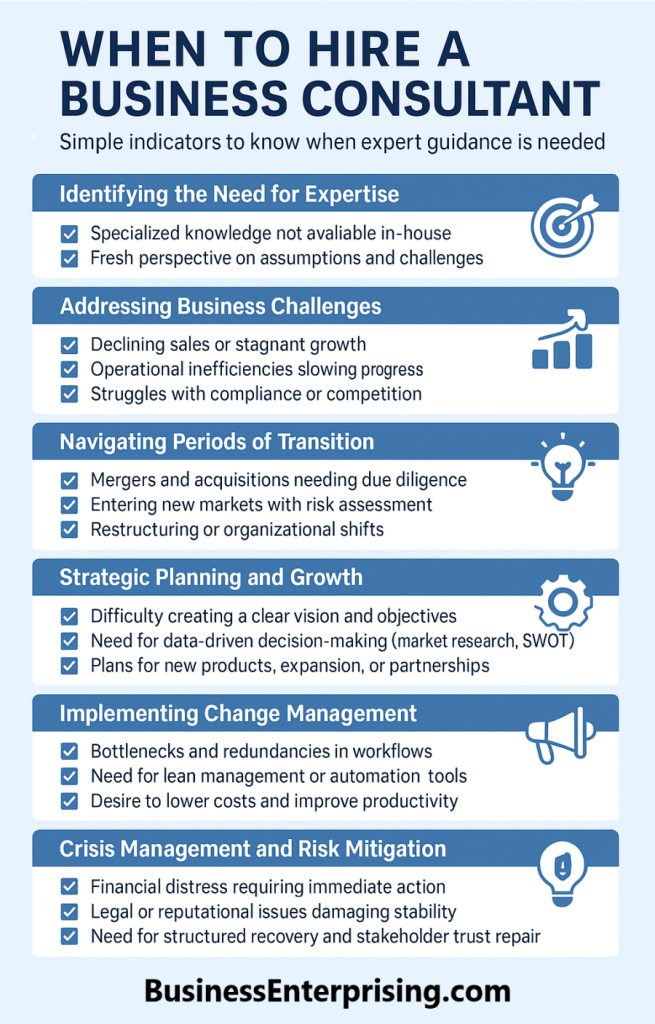
Identifying the Need for Expertise
One of the primary reasons companies hire business consultants is the need for specialized expertise that may not be available in-house. Consultants bring a wealth of knowledge and experience in specific areas such as management, finance, marketing, operations, and human resources. When a company encounters issues beyond the scope of its internal capabilities, a consultant can provide valuable insights and solutions. For instance, a business looking to implement a new technology or streamline its supply chain may benefit from a consultant with specialized knowledge in these areas. Additionally, consultants can offer fresh perspectives, challenging existing assumptions and introducing innovative approaches.
Addressing Business Challenges
Companies often face significant challenges that can impede growth and profitability. These challenges may include declining sales, operational inefficiencies, market competition, or regulatory compliance issues. When internal efforts to address these challenges prove insufficient, that’s an example of when to hire a business consultant. An outside business expert can help identify the root causes and develop effective strategies. For example, if a company experiences a prolonged period of stagnant or declining sales, a consultant with expertise in sales and marketing can conduct a thorough analysis and recommend strategies to revitalize growth. Similarly, if operational inefficiencies are affecting productivity, a consultant can assess processes and suggest improvements to enhance efficiency.
Navigating Periods of Transition
Business transitions, such as mergers and acquisitions, restructuring, or entering new markets, often require careful planning and execution. These transitions can be complex and fraught with risks, making it essential to have expert guidance. Hiring a business consultant during such periods can help ensure a smooth and successful transition. For instance, during a merger or acquisition, a consultant can assist with due diligence, integration planning, and change management, ensuring that the combined entity achieves its strategic objectives. Likewise, when entering new markets, a consultant can provide valuable market insights, assess competitive dynamics, and develop market entry strategies to minimize risks and maximize opportunities.
Strategic Planning and Growth
Effective strategic planning is critical for long-term success. Yet many companies struggle to develop and implement strategies on their own. A business consultant can guide the planning process by helping companies define vision, set objectives, and create actionable plans. Consultants conduct market research, competitive analysis, and SWOT reviews to provide data and insights that support better decision-making. They also identify growth opportunities, such as launching new products, expanding geographically, or building strategic partnerships. Consultants then develop clear plans to capitalize on these opportunities. Their expertise ensures measurable goals are set and progress tracked. This structured approach helps companies keep initiatives on course and achieve the long-term outcomes they desire.
Enhancing Operational Efficiency
Operational inefficiencies can hinder a company’s ability to compete effectively and achieve its goals. When internal efforts to improve operations fall short, a business consultant can provide an objective assessment and recommend best practices. Consultants analyze workflows, processes, and systems to identify bottlenecks, redundancies, and areas for improvement. They can also introduce lean management principles, automation technologies, and performance metrics to enhance productivity and reduce costs. For example, a consultant specializing in operations may recommend process reengineering to streamline manufacturing, optimize inventory management, and improve supply chain coordination. By implementing these recommendations, companies can achieve higher efficiency, lower costs, and improved overall performance.
Implementing Change Management
Change is inevitable in business, whether due to internal initiatives or external forces. However, managing change effectively can be challenging, especially in large organizations. Resistance to change, communication breakdowns, and lack of alignment can derail change initiatives. Hiring a business consultant can help navigate these challenges by providing expertise in change management. Consultants develop comprehensive change management plans that address the human and organizational aspects of change. They conduct stakeholder analysis, develop communication strategies, and implement training programs to ensure that employees understand and embrace the change. Additionally, consultants provide ongoing support and monitoring to address any issues that arise during the implementation process. Their objective perspective and experience in managing change can significantly increase the likelihood of successful outcomes.
Crisis Management and Risk Mitigation
In times of crisis, such as financial distress, legal issues, or reputational damage, companies may struggle to respond effectively. A business consultant with expertise in crisis management can provide critical support, helping companies navigate through turbulent times. Consultants conduct rapid assessments to understand the extent of the crisis, develop response plans, and implement mitigation strategies. For example, in the case of financial distress, a consultant may recommend cost-cutting measures, restructuring, or refinancing options to stabilize the business. Similarly, in the event of reputational damage, a consultant can help manage communication with stakeholders, develop a recovery plan, and implement measures to rebuild trust. Their experience in handling crises enables them to act swiftly and decisively, minimizing the impact on the business.
Leveraging Technology and Innovation
In today’s digital age, leveraging technology and innovation is essential for staying competitive. However, identifying and implementing the right technologies can be challenging, especially for companies with limited IT expertise. A business consultant specializing in technology can help companies assess their technology needs, identify suitable solutions, and implement them effectively. Consultants provide insights into emerging technologies, such as artificial intelligence, blockchain, and cloud computing, and recommend ways to integrate them into business operations. They also assist with digital transformation initiatives, ensuring that technology investments align with strategic goals and deliver measurable benefits. By leveraging the expertise of a technology consultant, companies can harness the power of innovation to drive growth and efficiency.
Conclusion
Knowing when to hire a business consultant can provide significant value to companies facing various challenges and seeking growth opportunities. Whether addressing specific issues, navigating transitions, enhancing efficiency, implementing change, managing crises, or leveraging technology, consultants offer the expertise and objective perspective needed to achieve desired outcomes. Recognizing the right time to engage a consultant is crucial for maximizing the benefits of their services. By understanding the indicators and scenarios outlined in this article, companies can make informed decisions and strategically utilize business consultants to drive success.
In conclusion, the decision on when to hire a business consultant should be guided by a clear understanding of the company’s needs, challenges, and goals. Consultants bring a wealth of knowledge and experience that can help businesses overcome obstacles and achieve their objectives. As the business environment continues to evolve, the role of consultants in providing expert guidance and strategic insights will remain essential for companies striving for growth and success.


